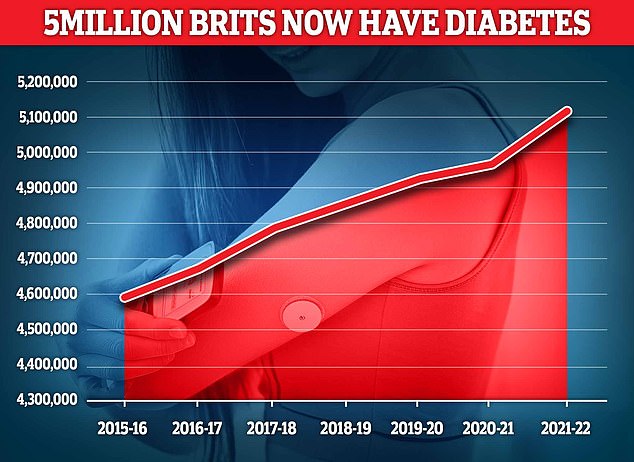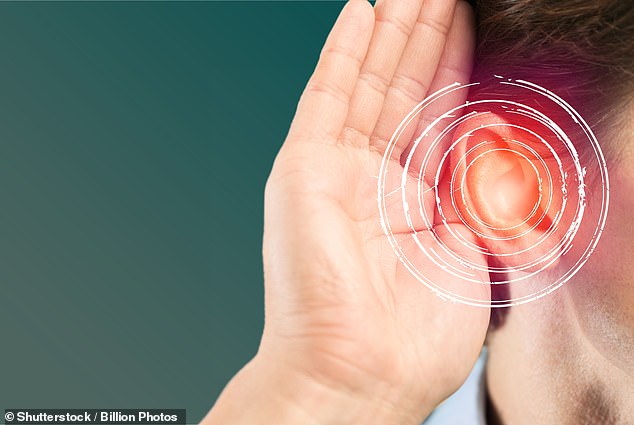It’s a common hallmark of advancing age or youth spent in the front row at concerts.
But hearing loss could also be a hidden sign that you have diabetes.
Almost 6 million Britons have diabetes, but charities estimate 1.2 million are living with the undiagnosed disease.
Experts are now urging people to be aware that changes in their hearing could indicate they are one of these silent sufferers.
Rob Ormerod, audiologist at Bayfields Opticians and Audiologists, explained that health status could have a profound impact on the health of our ears.
Rob Ormerod, audiologist at Bayfields Opticians and Audiologists, explained that health status could have a profound impact on the health of our ears.
“The high and low blood sugar levels experienced by diabetics can affect blood flow and cause damage to the blood vessels in the inner ear, affecting the nerve signals the ear receives,” he said.
This included a change that happens to all of us, usually as we age: hearing loss.
“Research shows that people with diabetes have twice the risk of hearing loss,” said Mr Ormerod.
He added that people may have difficulty realizing that they are experiencing hearing loss, since it tends to progress slowly over time.
“Hearing loss can often be difficult to detect as it tends to occur gradually, but if you have trouble following conversations and find that you are turning up the volume on your devices, it may be due to a deterioration in your hearing.” said.
While diabetes is just one of countless potential causes of hearing loss, Mr Ormerod urged anyone suffering from these symptoms to seek help as treatment could have a profound impact.
Hearing loss is just one ear-related sign that you might be an undiagnosed diabetic.
Ear infections are a relatively common ailment, but experiencing them frequently could be a sign that you have diabetes.
“Diabetics are more likely to get ear infections,” explained Mr Ormerod.
“This is due to reduced blood flow to the ears, which in turn can reduce the strength of your immune system and its ability to fight infections.”
He advised people to take basic precautions, such as not putting cotton swabs in their ears and using earplugs when swimming, to avoid ear infections in general.
However, he added that if you are still suffering, contact your GP or pharmacist for advice on investigating possible causes, including diabetes.
Tinnitus, in which noises such as ringing or ringing are heard inside the ear that are not coming from an external source, could also be a sign of diabetes.
Ormerod said: ”The inner ear, or cochlea, depends on oxygen and blood glucose to function effectively.
“Since diabetes has a direct impact on blood glucose levels due to abnormal insulin levels, this can have an effect on the cochlea and cause tinnitus.”
While he said tinnitus could be caused by other problems less serious than diabetes, such as earwax buildup, it was important to investigate it to determine the cause and advise on treatment.
Diabetes, in which the body does not react properly to insulin (the hormone that controls the absorption of sugar into the blood) and cannot properly regulate blood sugar and glucose levels, is a growing health problem.
There are two types of diabetes, called type 1 and type 2.
Type 1 is when the body does not produce insulin at all and is thought to be related to genes.

Almost 4.3 million people were living with diabetes in 2021/22. And another 850,000 people have diabetes and are completely unaware of it, which is worrying because untreated type 2 diabetes can lead to complications such as heart disease and stroke.
On the other hand, type 2 is more common and is where the body is able to produce insulin but does not produce enough or does not function properly.
Factors such as age and obesity increase the risk of developing type 2 diabetes, and this is thought to be increasing in Britain, especially among young adults.
A recent report from Diabetes UK suggests there has been a staggering 39 per cent rise in type 2 diabetes in people under 40, in a trend attributed to rising levels of obesity.
In addition to hearing loss, other symptoms of diabetes include urinating more than usual, feeling thirsty all the time, fatigue, losing weight without trying, itching around the genitals, and blurred vision.


